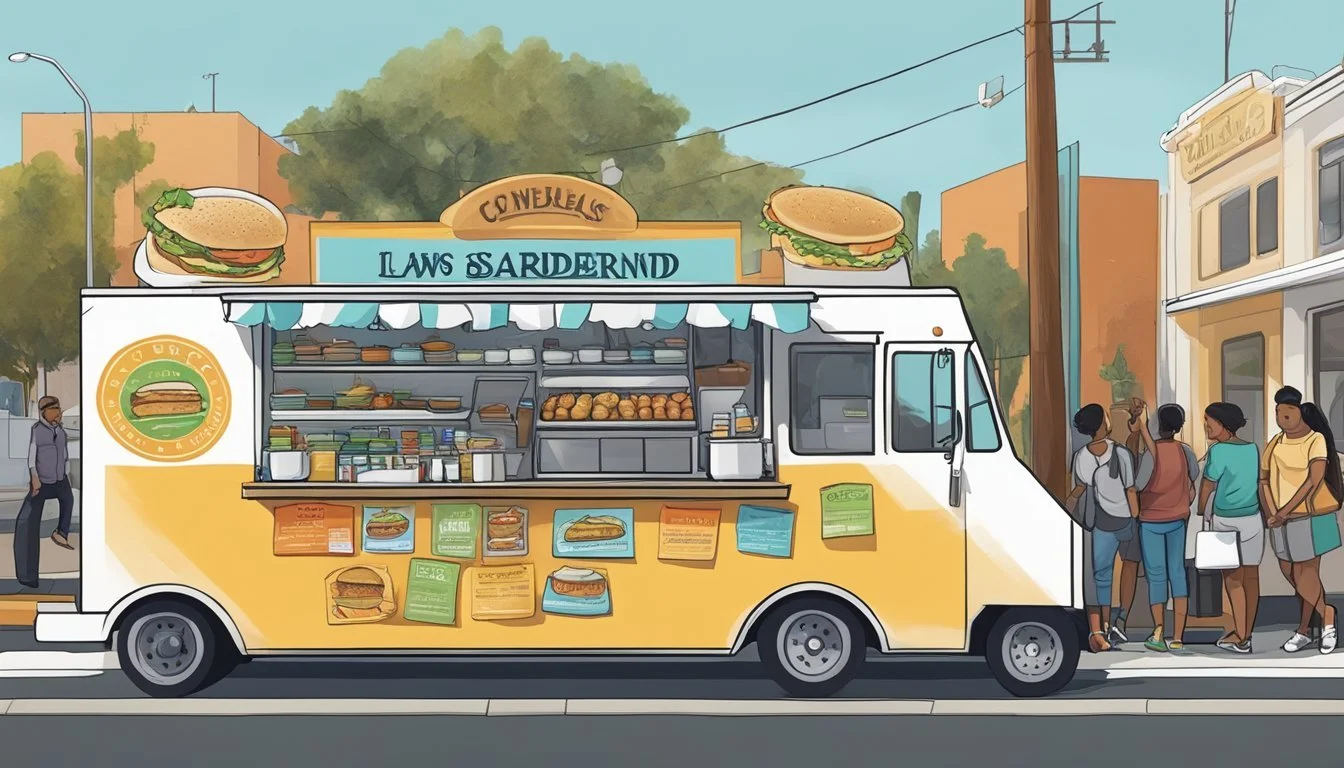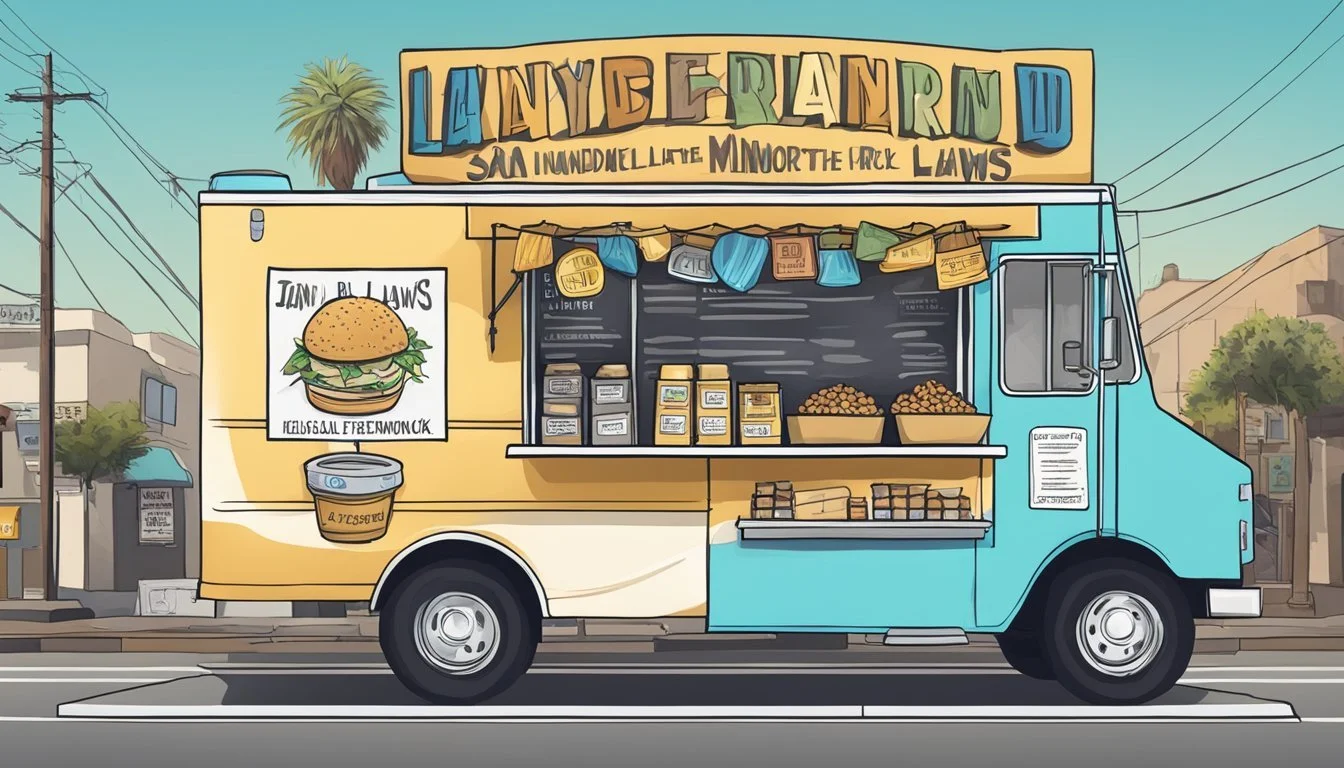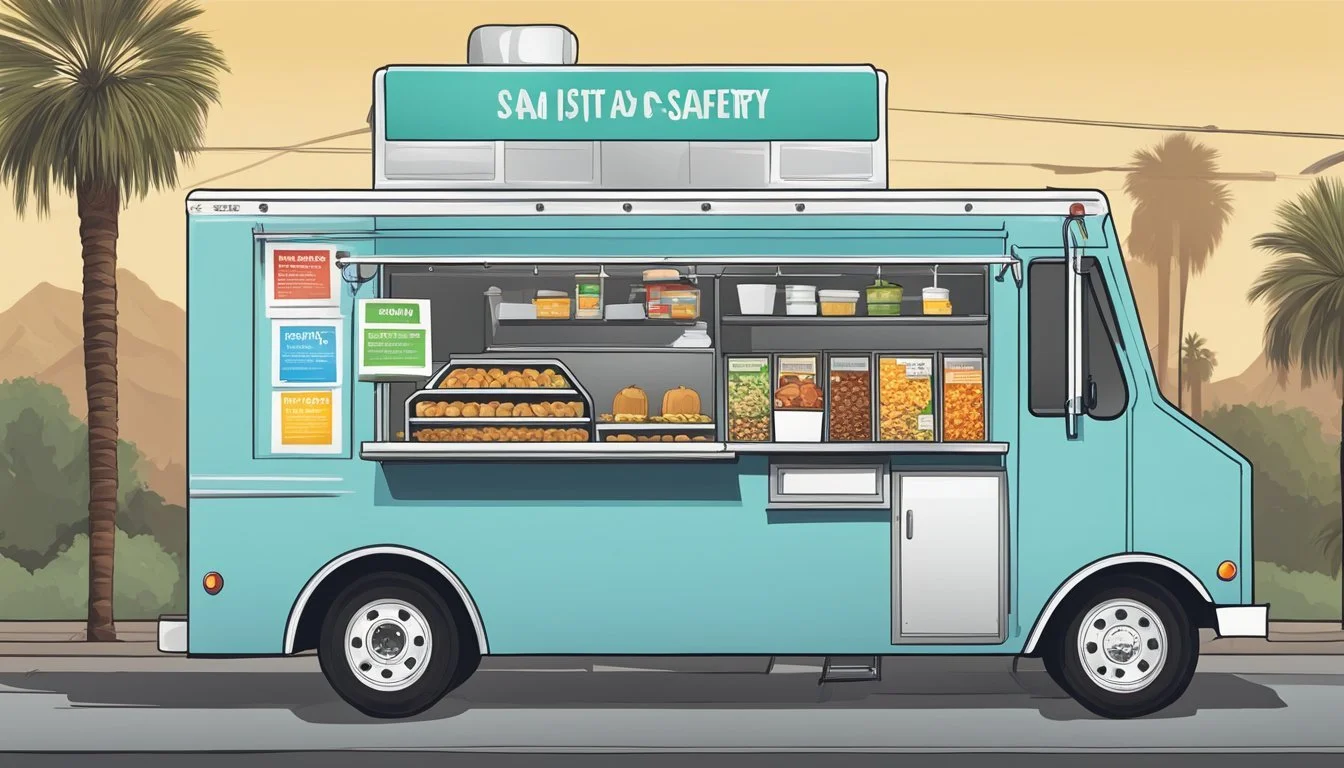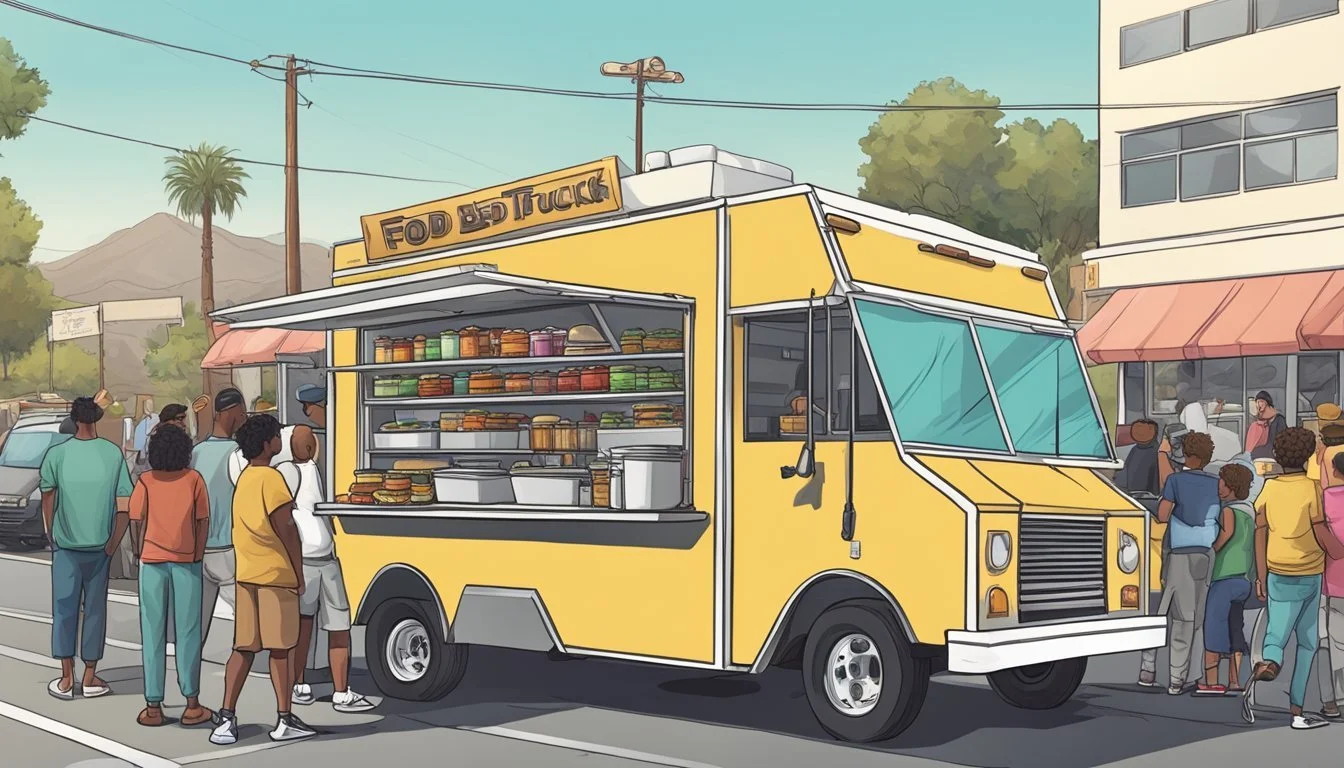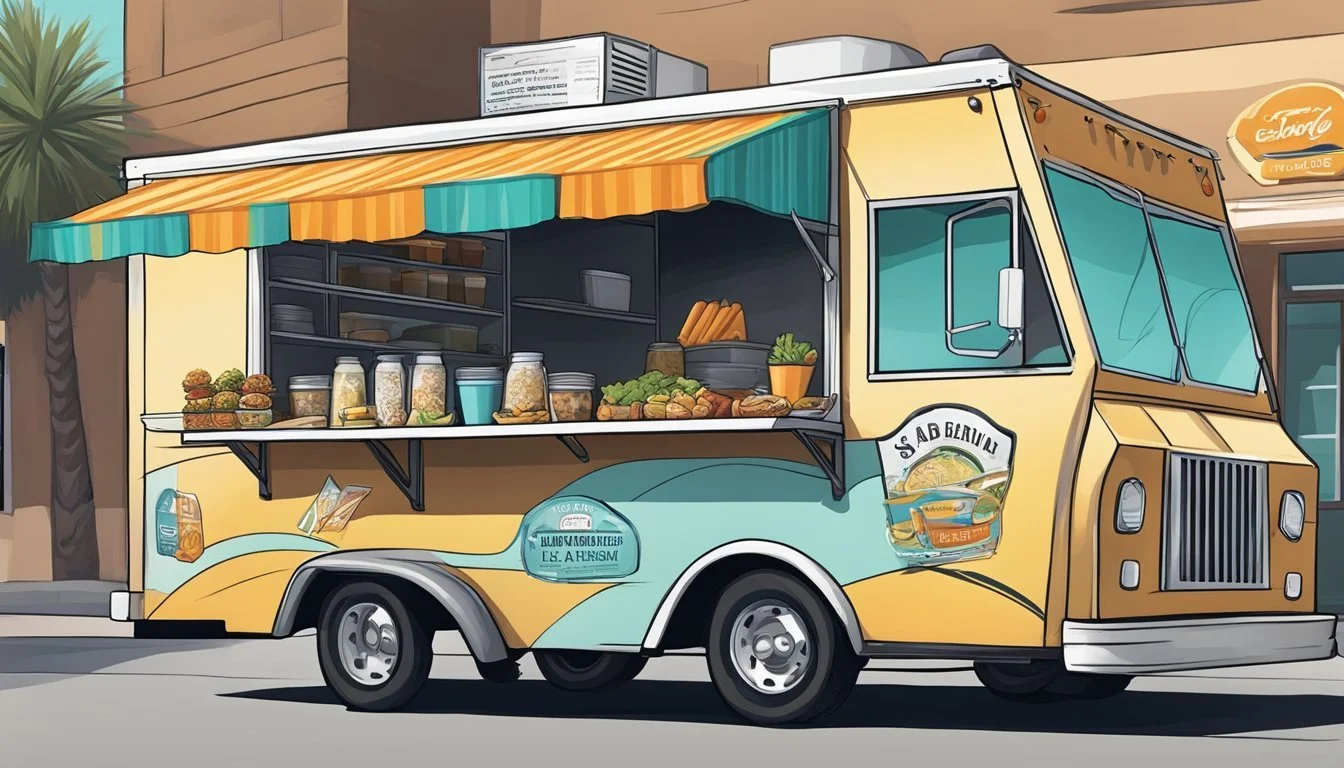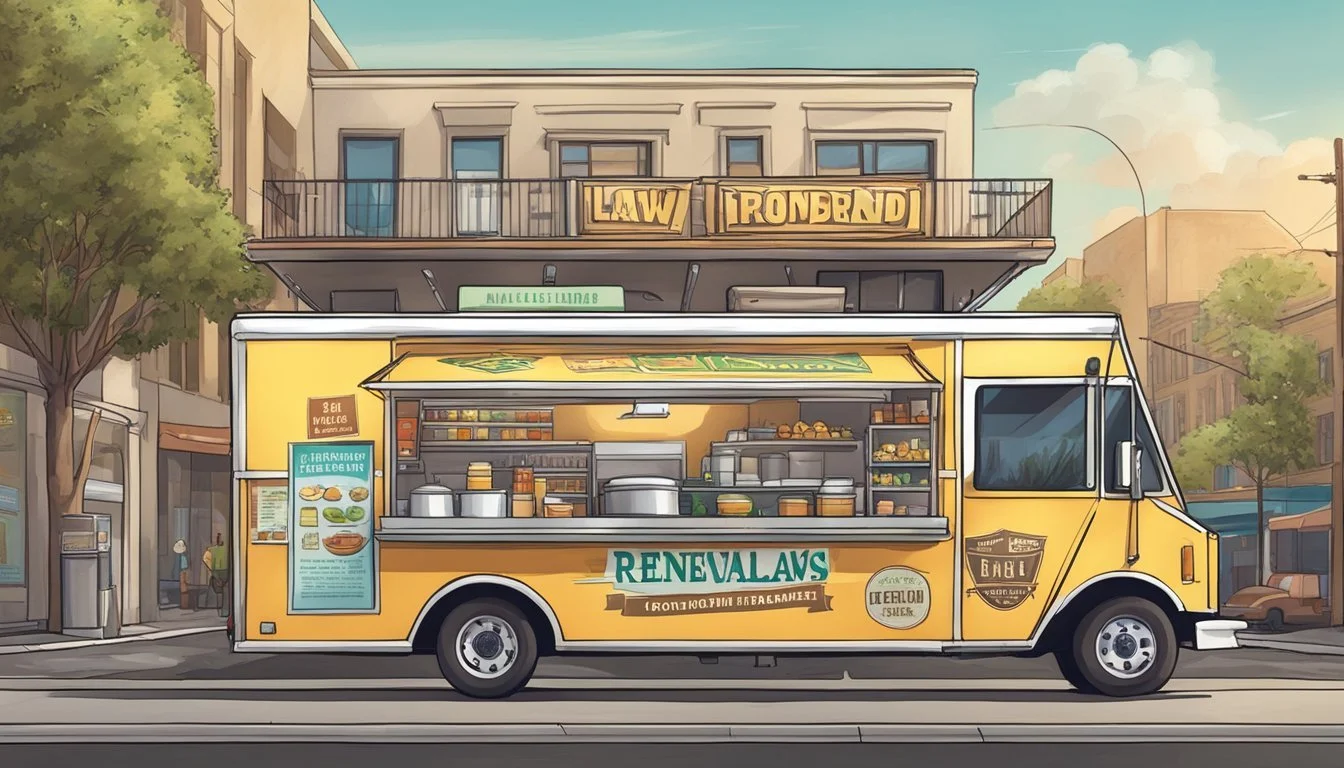Food Truck Laws San Bernardino, California
Regulations Every Vendor Should Know
Food truck entrepreneurs in San Bernardino County, California, must navigate a series of regulations to ensure their mobile food facilities operate within the law. Central to legal operation is obtaining a health permit, a process that necessitates the food truck to undergo a Plan Check Review to meet all Department of Environmental Health Services Plan Check requirements. Once the truck passes this stage, operators can contact Plan Check for further instructions on compliance and approval.
Operating a food truck in this region also demands strict adherence to food safety and storage standards. All food preparation must occur inside the truck, with potentially hazardous foods being held at safe temperatures — below 41˚F or above 135˚F. This guarantees that food provided to the public is not adulterated or spoiled. In addition to temperature control, proper sourcing from approved suppliers is critical, with no home preparation or storage of food items allowed.
To further support mobile food vendors, San Bernardino County has developed guidelines that aim to foster economic inclusion while modernizing regulations to accommodate a range of mobile food operations, including sidewalk vendors. These guidelines ensure that food trucks and similar enterprises are well-integrated into the regulated vending economy, providing a clearer path for entrepreneurs to operate legally and successfully within the county.
Understanding the Legal Framework
Navigating the legal landscape for food trucks in San Bernardino County requires understanding a multilayered set of regulations. Operators must ensure compliance with county codes, state laws, and local ordinances to legally run a mobile food facility.
San Bernardino County Code Compliance
In San Bernardino County, food trucks must obtain county approval and a health permit if selling food or drinks. These are crucial steps in the process of legally operating a food truck. The Department of Environmental Health Services (EHS) issues annual health permits for which fees are applicable. Requirements for food truck operations and necessary permits can vary within county jurisdictions, so understanding and adhering to these specific county-level requirements is vital.
California Retail Food Code Regulations
Under the California Retail Food Code (CRFC), mobile food operations, including food trucks and sidewalk vendors, are provided a framework designed to promote economic inclusion and modernize the industry. This includes adherence to safety and sanitation standards aimed at ensuring public health. Compliance with these regulations is essential for food truck operators to obtain permits and legally enter the regulated vending economy.
Local Laws and Ordinances
Operational freedom for food trucks also relies on adherence to local laws and ordinances. Each city within San Bernardino County may have its unique set of rules governing mobile food vending. Operators must also acquire a valid business license or peddler's license, in addition to health department approval. Understanding and navigating these local regulations is critical for seamless food truck operations.
Setting Up Your Food Truck Business
Starting a food truck business in San Bernardino County involves critical steps such as choosing the right business entity, obtaining necessary licenses and permits, and securing commissary space and parking for operations. Each of these components ensures that your food truck complies with legal standards and operates efficiently.
Choosing the Right Business Entity
When launching a food truck business, selecting an appropriate business entity is a foundational step. Entities like a Limited Liability Company (LLC), sole proprietorship, partnership, or corporation are options to consider. An LLC can provide liability protection and flexibility in management. A sole proprietorship or partnership could be suitable for smaller operations, although they offer less personal liability protection compared to an LLC or corporation.
Securing Business Licenses and Permits
To operate legally, a food truck must have the correct business license and permits. In San Bernardino County, this includes a food facility health permit specific for mobile food vendors, ensuring all food safety regulations are met. Vendors must comply with the California Retail Food Code, and it's essential to have a current San Bernardino County food handlers card for all employees handling food.
Finding a Commissary and Parking
A commissary serves as a home base for food trucks where food preparation, storage, and cleaning can take place. Obtaining access to a commissary is a county requirement. As for parking, a food truck doing business in one location for more than one hour must operate within 200 feet of an approved restroom. Establishing a regular parking spot is also critical for the day-to-day operation and can influence customer habits and business success.
Health and Safety Compliance
In San Bernardino, California, food truck operators must navigate a stringent health and safety regulatory environment to ensure the well-being of the public. Compliance with the Department of Public Health regulations is paramount, from obtaining the appropriate health permits to adhering to strict food safety protocols.
Obtaining a Health Permit
A health permit is vital for operating a food truck in San Bernardino, and it signifies that the unit meets the standards set by the County Health Department. To obtain this permit, operators must submit their food truck for an inspection, providing assurance that the truck is well-equipped to prepare, handle, and store food safely. For more information on acquiring a permit, vendors can follow the guidelines outlined by the San Bernardino County Department of Public Health.
Food Safety and Handling Requirements
Adherence to food safety and handling guidelines is imperative. All food workers on the truck must hold a valid San Bernardino County food handlers card, demonstrating completion of required food safety training. Potentially hazardous food must be stored at safe temperatures — either at or below 41°F (for cold foods) or 135°F or above (for hot foods) to prevent contamination or spoilage. Further details on food safety requirements can be noted from the Environmental Health Services documentation.
Inspections and Certifications
Regular inspections by the Health Department ensure that food trucks continue to meet safety guidelines. During inspections, officials check for compliance in areas such as food storage, temperature controls, sanitation, and employee health and hygiene. Food trucks must display a valid health permit and, if applicable, a current decal sticker prominently. Additionally, at least one original manager's certificate — proof of advanced food safety certification — must be present on the truck at all times, ensuring that at least one staff member is fully trained in food safety supervision. More specifics on inspection criteria and certification can be referenced from the county's Food Truck General Requirements Checklist.
Operational Aspects of Running a Food Truck
In San Bernardino County, running a food truck entails thorough planning regarding equipment, menu curation, and adherence to specialized food and beverage regulations. These operational facets are crucial for compliance and success in the mobile food industry.
Equipment and Vehicle Considerations
Owning or leasing a food truck in San Bernardino requires compliance with vehicle safety regulations and installation of commercial-grade equipment. It is essential that all food trucks have a current decal sticker posted on the vehicle, indicating adherence to the County's health and safety inspections. Equipment like refrigeration must be capable of keeping potentially hazardous foods at safe temperatures — below 41°F or above 135°F. Trucks must provide adequate facilities, including access to hand-washing stations with hot-running water for 10 to 15 seconds to ensure hygienic food handling.
Menu Planning and Ingredient Sourcing
When crafting a menu, truck operators must source ingredients from approved suppliers, ensuring food is not adulterated, contaminated, or spoiled. In San Bernardino, prepackaged and prepared foods should meet the California Retail Food Code requirements and temporary food operations have specific guidelines that must be adhered to. The menu should be devised with storage capabilities in mind, to maximize the use of fresh vegetables and other perishables, and to prevent food waste. A food truck's menu should reflect the capacity to maintain quality and safety in a mobile environment.
Food and Beverage Sales and Alcohol Regulations
The sale of food and beverages from a food truck in San Bernardino is regulated and monitored. Any truck planning to sell alcoholic beverages must secure the appropriate liquor license. Permits are specific concerning the kinds of alcohol that can be served, typically necessitating a separate area for selling and consuming alcoholic drinks. Furthermore, food trucks must ensure that all potentially hazardous foods (PHF) held at or above 135°F are discarded at the end of the operating day to avoid any health risks.
Financial and Tax Obligations
Food truck operators in San Bernardino, California, must navigate a variety of financial and tax obligations to ensure legal compliance and financial viability. They need to understand the specific requirements for sales tax, business insurance, cost management, and overhead.
Understanding Sales Tax and Reseller Permits
Operating a food truck in San Bernardino requires thorough knowledge of sales tax requirements. Food truck owners must obtain a seller's permit, which allows them to collect sales tax on taxable items. It is important to consistently record all sales, as the State of California requires food truck operators to report and remit sales tax regularly.
Business Insurance and Risk Management
Business insurance is critical for food truck operators, not only to comply with regulations but to manage risks. They need to have coverage for potential liabilities, including property damage, injury, and food safety issues. Vendors are often required to provide proof of insurance coverage when applying for permits or participating in events.
Managing Costs and Overhead
Food truck owners face various operational costs and overhead, such as ingredient purchasing, vehicle maintenance, and staff wages. To remain profitable, it's essential to monitor these expenses closely. Rent for commissary space, fuel, and utility costs associated with the food truck also contribute to the total overhead. Adopting effective strategies to keep these expenses within budget is vital for the financial health of the business.
Marketing and Customer Engagement
When crafting a business plan, food vendors in San Bernardino County should emphasize a strong marketing strategy. Utilizing social media platforms is critical for raising awareness and engaging with potential customers. A clear, vibrant online presence can showcase the menu, location updates, and special offers, drawing in both repeat and new patrons.
Food trucks often thrive in markets and farmer's markets, where there's a built-in crowd looking for unique and delicious food options. Vendors should identify popular community events and secure spots within them to capitalize on high foot traffic. Networking with event organizers and other vendors can lead to collaborative opportunities, thereby expanding their reach.
Below are some actionable marketing tactics:
Brand Consistency: Ensure the food truck’s theme and branding remain consistent across all marketing materials and social media channels.
Customer Engagement: Regularly interact with customers via platforms like Twitter and Instagram. Share updates, gather feedback, and run contests to maintain interest.
Leverage Reviews: Encourage and highlight positive customer reviews to build trust and attract new customers.
An effective business plan for food vendors should also cover:
Target Audience: Clearly define who the ideal customers are and the best ways to reach them.
Marketing Channels: Select the most effective channels, whether they are online (social media, email marketing) or offline (local advertising, participation in community events).
Ultimately, knowledgeable food trucks understand the importance of visibility—both online and at local gathering spots like community events—to remain top of mind for customers.
Renewals, Penalties, and Legal Consequences
Operating a food truck in San Bernardino County requires strict adherence to specific laws and regulations. Continual compliance ensures the vitality of a food truck business through the renewal of permits and avoidance of possible legal issues that can arise from violations.
Keeping Licenses and Permits Updated
Owners must regularly renew their mobile food vending permit to legally operate food trucks. Failure to update or renew the necessary licenses can result in fines and potentially the revocation of the food truck's operating license. It is crucial for owners to stay informed of any changes to the county's regulations to ensure their operations remain compliant.
Renewal: Annually required by the Department of Environmental Health.
Update: Must reflect any changes in menu, vehicle, or operation.
Dealing with Violations and Legal Action
When a food truck is found in violation of the health codes, it may be subjected to warnings, fines, or even criminal prosecution for serious breaches. Minor violations often receive a warning, yet repeated non-compliance can escalate to harsher penalties.
Fines: Structured depending on the severity of the infraction.
Revocation: May occur after multiple violations or inability to pay fines.
Criminal Prosecution: Possible for egregious or repeated non-compliance.
Additional Considerations for Food Truck Operators
Food truck operators in San Bernardino, California, should consider several specific factors to maintain compliance and foster positive relationships within the community. These factors include navigating relationships with existing restaurants, operating regulations for unincorporated areas, and collaborating effectively with government agencies and schools.
Navigating Relationships with Brick-and-Mortar Restaurants
Brick-and-mortar restaurants and food trucks often share customers within the same geographical regions, leading to a competitive environment. Food truck operators should engage respectfully with restaurant owners, possibly identifying opportunities for collaboration or co-hosted events. It's beneficial to avoid direct competition by setting up in proximity to restaurants during their peak business hours unless a cooperative agreement is in place.
Operating in Unincorporated Areas
San Bernardino’s unincorporated areas permit food trucks to operate under certain conditions. Operators must ensure they have the correct zoning permissions and abide by specific health and safety regulations. According to the guidelines provided by the San Bernardino County Environmental Health Services, food trucks must maintain valid health permits and follow all applicable laws to operate legally in these regions.
Collaborating with Government Agencies and Schools
Strong relationships with local government agencies ensure that food truck operators comply with the latest food safety regulations and business practices. This may include regular inspections and permit renewals. When working with schools, operators must align their menu with student nutritional needs and school policies. It's important for food trucks to gain appropriate approvals and to satisfy any contractual requirements when establishing operations on or near school campuses.

